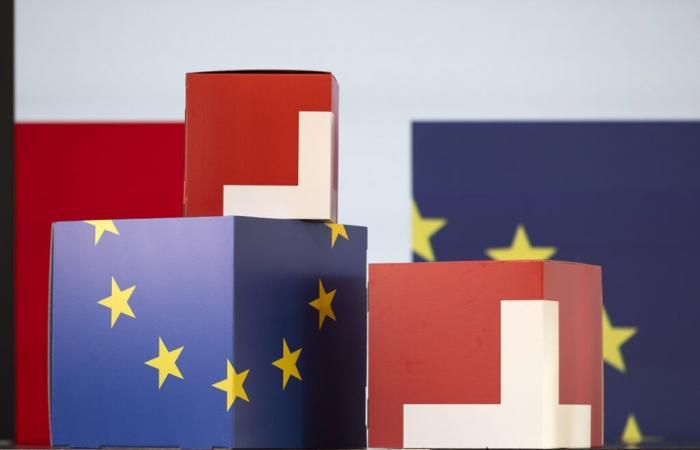Keystone-SDA
After 197 meetings, the negotiations on a material level between Switzerland and the European Union (EU) have been concluded. According to the Federal Council, the result achieved is “positive” and respects the negotiating mandate entrusted to the chief negotiator, Patric Franzen.
This content was published on
December 20, 2024 – 5.16pm
Satisfied
(Keystone-ATS) “We are satisfied with the result achieved,” the head of Swiss diplomacy, Ignazio Cassis, said in front of the media, according to which a “milestone” had been set in relations between Bern and Brussels to the benefit of our economy, our research and also of our safety.
This is an important step, according to the Ticino federal councilor, taking into account the turbulent period we are experiencing – Cassis cited the war and conflicts in Ukraine, Africa and the Middle East – characterized by a world that is increasingly less democratic and tending towards protectionism.
Popular rights guaranteed
Addressing the aspects related to the dynamic recovery of European law, Cassis explained that only the five Bilateral I agreements are involved, while the rules on state aid apply only in three specific sectors: air transport, land transport and electricity.
As is the case now, in the event of disagreements, it will be up to a joint Swiss-EU committee to deal with the case, Cassis recalled. In case of disagreement, the ball would be passed to an arbitration tribunal made up of Swiss and European judges: the latter body would have the final say. The arbitral tribunal could turn to the European Court of Justice but only to obtain a legal opinion, Cassis specified, adding that popular rights are not affected. In short, internal democratic procedures in Switzerland are respected (for example the right to referendum).
Cohesion contribution
Regarding Switzerland's cohesion contribution – which will become regular – to the EU, it would amount to 350 million francs per year from 2030 to 2036.
Meanwhile, still at the cohesion level, Switzerland has committed to paying an additional financial amount of 130 million francs for each year from 2025 to the end of 2029.
All contributions will go directly to programs and projects in Switzerland's partner countries within the EU, assured the FDP Federal Councilor, in areas such as migration or vocational training.
Safeguard clause
Other delicate aspects of the negotiations concern the free movement of people and the issue of wages. According to the “minister” of justice and police, Beat Jans, Switzerland has managed to obtain several exceptions regarding the free movement of people, expulsions and the protection of the social system. In the case of expulsions for criminal offenses, as provided for by the Constitution, everything remains as it is now, Jans declared.
As today, in the future only people looking for work will be able to settle here, while everyone else will have to demonstrate that they have sufficient means to live. After five years of stay, an EU citizen will be able to obtain a residence permit. This period may be extended if the person in question has been dependent on social assistance or unemployed for a certain period. In this case, the socialist “minister” underlined, the conditions are more rigid than the European ones.
Last but not least, in the event of serious social and economic repercussions caused by free movement, we managed to obtain an escape clause. “My department – explained the Basel federal councilor – will have to present a project by the end of February that includes the criteria to be met to invoke this clause. It will be up to Switzerland to decide whether and when to activate it in complete autonomy, said Jans, who spoke of a clear negotiating success in this regard.
Salaries and research
On the topic of wages, the head of economics, training and research, Guy Parmelin, underlined that the agreements preserve the current level of wage protection and the same working conditions for seconded staff (announcement period and guarantees) .
Thanks to the negotiations, Parmelin added, we have obtained exceptions to protect our essential interests in the fields of land transport, agricultural products and electricity. The public service, among other things, will not be affected.
as regards research, from 2025 researchers will be able to participate in almost all calls for tenders under Horizon Europe, the Euratom program and the Digital Europe programme. For Erasmus+, added the UDC federal councilor, this will apply from 2027.
The next steps
The signing of the agreement is scheduled for next spring. Before the summer a draft message will be sent out for consultation so that it can be transmitted to parliament presumably at the beginning of 2026.
As regards the message, the Federal Council intends to group the agreements aimed at stabilizing the bilateral path (updating existing agreements, rules on state aid, participation in EU programs and Swiss contribution) in a federal “stabilisation” decree , while the three new agreements (electricity, food safety and health) will be presented separately in federal “development” decrees.






